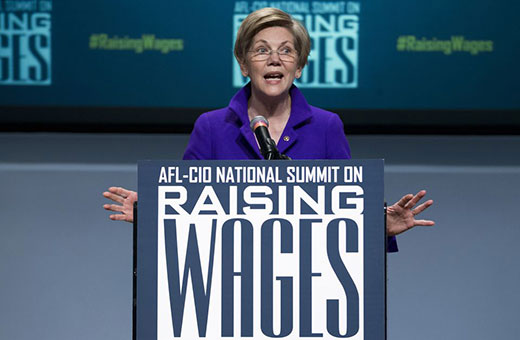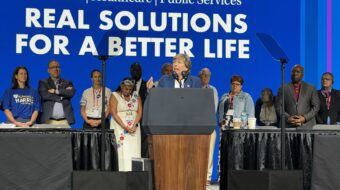
WASHINGTON – The nation’s largest labor federation, the AFL-CIO, rolled out here today its first- ever Raising Wages agenda.
Speaking to the hundreds of union members and allies gathered for the AFL-CIO National Summit on Raising Wages, the federation’s president, Richard Trumka, declared that it will involve accountability for all office holders and candidates, coming down to a basic question: “Are you satisfied with an America where the vast majority works harder and harder for less and less, or do you propose to build an America where we the people, share in the wealth we create? This is the single standard by which we will judge leadership.”
The gathering here today was another indication that labor’s old style of simple transactional politics is dead.
“Not one of us can go it alone,” Trumka declared. “We must unify on our common ground, raise the bar, then go out there and raise it even higher.”
If the summit here is any indication the progressive movement may be witnessing cooperation and collaboration on an unprecedented scale – realizing, in effect, many of the goals laid out at the AFL-CIO’s 2013 convention – aiming to unite the labor movement with many allies who share its goals.
“We hoped for exactly what we’ve seen today,” Trumka declared. “People who share our vision of a better America coming together and getting things done.
At the summit here today there were union organizers, social media activists and religious leaders engaging in robust talks with one another in the hallways. Professional economists shared breakfast at tables with field organizers from local unions and other organizations, discussing proposals on how best to raise wages. Business leaders chatted with workers about how to overhaul a system that results in unreasonable schedules for millions of workers.
David Borris, owner of Hel’s Kitchen Catering in Chicago, explained why, from the point of view of a business owner, higher wages were important. “If one person gets paid $10 million, he explained, it is not as useful to small business as 100 people getting paid $100,000 each. It’s the same money getting paid out but the guy with the $10 million is more likely to stash it offshore while the 100 with the $100,00 each will spend it in the community, growing our business’ It’s also a matter that treating workers with respect leaves them with something to spend at a theater or in a restaurant.”
The “roundtable discussion” on the morning agenda was also unique as “roundtables” at conferences go. In addition to the businessman talking about how higher wages will grow his profits there were people from many movements participating. A Walmart worker debated with a think tank president and the mayor of Boston, himself a member of the Laborer’s union, picked up some pointers from a Fight for 15 activist.
Trumka singled out what he said were two subjects people don’t automatically think about as work and wages issues: immigration and race.
“Let me put it plainly,” he declared. “Our Raising Wages campaign can only be complete when there is justice for America’s immigrants and people of color. We must have a pathway to citizenship for all immigrants, and we must be a country of dignity for all people, regardless of race or ethnicity. Justice at work and justice in our community are intertwined, and both must advance for either to grow.”
Conference participants, rejecting the notion that the wage gap is “just the way things are” and that nothing can really be done about it hammered out a plan of action.
The AFL-CIO announced that in 2015, for example, it, along with community partners, will hold Raising Wages summits in the first four presidential primary states – Iowa, New Hampshire, Nevada, and South Carolina. “And we’re not waiting around,” Trumka declared: “The first state summit will be in Iowa this spring. Each summit will bring together diverse voices, just as we did today, to lay out the entire Raising Wages platform and establish state-based standards of accountability.”
Although the starting point for the agenda is a living wage for all workers and the availability of collective bargaining rights for all workers it goes on from there to become a comprehensive economic agenda that includes:
– Trade policies that lift incomes in America and around the world rather that pit workers against one another.
– Strong labor laws that give all workers the opportunity to bargain for higher wages without fear of losing their jobs.
– Stricter controls on Wall Street’s financial speculation. “It means treating Wall Street like it is part of America, not above America,” Trumka declared.
– Allowing workers to demand and win fair work schedules, paid sick leave and overtime checks.
– Ending all tax benefits for companies that move jobs offshore.
Photo: Sen. Elizabeth Warren. | Jose Luis Magana/AP












Comments